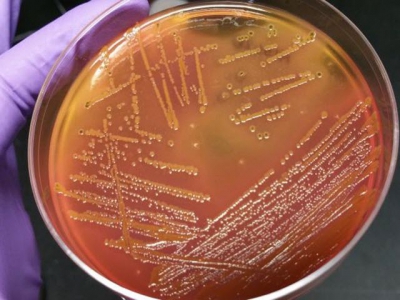Can mastitis treatment affect gut microbiome in dairy cattle?

Mastitis infusions probed for links to antibiotic-resistant bacteria in intestinal microbiome of dairy cattle.
A multidisciplinary team of Michigan State University scientists has designed a study to probe how antibiotic resistance in the intestinal microbiome of dairy cattle is affected by mastitis treatments.
The project — which includes collaborators from the Michigan State College of Natural Science, College of Agriculture & Natural Resources (CANR) and College of Veterinary Medicine (CVM) — is supported by a four-year, $498,000 grant from the Agriculture & Food Research Initiative of the U.S. Department of Agriculture's National Institute of Food & Agriculture.
The team, including experts in cattle husbandry, animal science, microbiology, genomics, epidemiology and statistics, is focusing on the life cycle of antibiotic-resistant bacteria: its origin, selection and spread.
“The emergence of bacterial populations that resist antibiotics commonly used in human and veterinary medicine is a major public health concern worldwide,” said project lead Shannon Manning, Michigan State Foundation professor in the department of microbiology and molecular genetics. “This important study will reveal whether antibiotic infusions used to treat mastitis contribute to increases in the abundance of antibiotic-resistant bacterial populations in the gut of dairy cattle.”
Manning, who also is a researcher with Michigan State AgBioResearch, added, “We use metagenomics, or the sequencing and analysis of the collective genomes of microbial communities in the gut, to figure out which communities are thriving in the presence of a pathogen and which are not, in an effort to identify microbial markers for disease and identify how it affects the abundance of antibiotic resistance genes. We are applying the same tools to analyze the data generated through this study.”
According to the announcement, ceftiofur, an antibiotic used on dairy farms to treat post-lactation mastitis, leaves antibiotic residues that can help select for resistant bacteria that are capable of spreading into the farm environment and other animals, limiting effective options for treatment.
“Several studies have examined the impact of antibiotics on the milk microbiome in dairy cattle, but very few have examined how the commonly used antibiotic ceftiofur impacts the intestinal microbiome,” Manning said. “Findings from this study can help inform current treatment guidelines to minimize resistance and promote the judicious use of antibiotics."
Manning explained that the project requires a collaborative, multidisciplinary team of researchers, with each investigator adding an important piece to the study.
For example, Lixin Zhang, an expert in understanding how antibiotic-resistant genes are transmitted and move within bacterial populations, will oversee the analysis of the gene transmission network using both genomic and epidemiological data in order to quantify the spread of resistance within and among cattle.
“In addition to selection pressure by antibiotics, transmission can greatly contribute to the increase of resistance,” said Zhang, a Michigan State assistant professor with joint appointments in the departments of microbiology and molecular genetics and epidemiology and biostatistics in the College of Human Medicine.
Other scientists participating in the project include Pamela Ruegg, professor and chair in the CANR department of animal science, and three faculty members who hold joint appointments in CANR and CVM: Ron Erskine, professor of large animal clinical sciences; Bo Norby, associate professor of large animal clinical sciences, and Lorraine Sordillo-Gandy, Meadow Brook chair in farm and animal health and well-being and professor of large animal clinical sciences.
Có thể bạn quan tâm
 Dietary fat may be key to dropping dairy cow GHG emissions
Dietary fat may be key to dropping dairy cow GHG emissions Adding supplemental fat to dairy cow diets may reduce cows’ methane yield regardless of grain used in the diet, say researchers.
 Project targets heat-stressed dairy cows
Project targets heat-stressed dairy cows Along with matching funding from industry, $1.47 million project at Cornell to study dairy cows' ability to withstand heat stress.
 Coordinated action needed on mastitis
Coordinated action needed on mastitis Noting that prevention is better than cure, global dairy experts convene in Denmark to discuss managing udder health and reducing antimicrobial use.